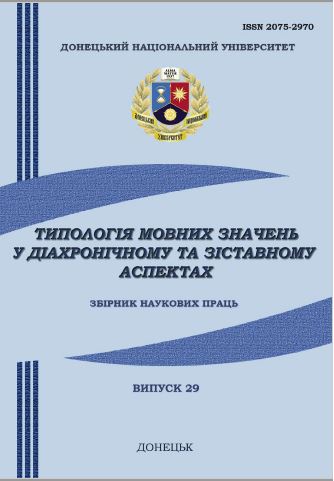Comparative composites as a result of dephraseologization of set similes in German and English.
Keywords:
set simile, dephraseologization, image-model, derivation, comparative compositeAbstract
This article deals with the structural, semantic and pragmatic ground of a mechanism of dephraseologizing English and German set similes which serve as a basis for comparative composites. The analysis of the corpus of units under discussion has shown that not all of the comparative composites have been built on the basis of set phrases, and not every set simile can be transformed into a compound adjective, in particular into a comparative composite. The examples clearly demonstrate not only the intensity of manifestation of the feature represented in the module-adjective in set similes and comparative composites, but also its expressiveness. Strengthening of the feature is not a result of the deprivation process only, since strengthening of an action or a state by means of comparison is the essence of the process of phraseologization of comparative word-combinations. It is obvious that the comparison of heterogeneous subjects or groups of subjects is bound to include the element of expressiveness. Metaphorical transfer, which lies in the foundation of this comparison, nearly always results into intensification of the expressed feature. Accordingly, the difference between a comparative and an adjective is not of the morphological-syntactic, but of the communicative nature. An integral unit is more flexible and convenient for communication.References
Амосова Н. Н. Этимологические основы словарного состава современного английского языка / Н. Н. Амосова. – М. : Изд-во лит-ры на иностр. яз., 1956. – 218 с.
Гатауллин Р. Г. Универбация синтаксических структур / Р. Г. Гатауллин // Теория поля в современном языкознании : межвуз. науч. сб. – Уфа : Изд-во Башкирского гос. ун-та, 2001. – С. 36–41.
Жуков А. В. Дефразеологизация в русском языке / А. В. Жуков // Вестник Новгородского гос. ун-та им. Ярослава Мудрого. Сер. “Гуманитарные науки : история, литературоведение, языкознание”. – 2000. – № 15. – C. 84–91.
Куклина И. Н. Явления фразеологизации и дефразеологизации в языке современной прессы : дисс. … кандидата филол. наук : 10.02.01 / Куклина Н. И. – М., 2006. – 251 с.
Мізін К. І. Компаративні фразеологічні одиниці сучасної німецької мови : шляхи утворення та ідеографія : дис. … кандидата філол. наук : 10.02.04 / Мізін К. І. – К., 2003. – 237 с.
Новикова Е. В. Эталоны сравнения в немецкой языковой картине мира : дисс. … кандидата филол. наук : 10.02.04 / Новикова Е. В. – Омск, 2006. – 160 с.
Огольцев В. М. Устойчивые сравнения в системе русской фразеологии / В. М. Огольцев. – Л. : Изд-во Ленинградского гос. ун-та, 1978. – 159 с.
Плотникова Л. И. Новое слово : порождение, функционирование, узуализация / Л. И. Плотникова. – Белгород : Изд-во Белгородского гос. ун-та, 2000. – 208 с.
Резенков А. В. Функционально-стилевой статус рекламных текстов малых форм : автореф. дисс. на соискание учен. степени канд. филол. наук : спец. 10.02.01 „Русский язык” / А. В. Резенков. – СПб., 2010. – 23 с.
Терентьев А. В. Адъективные компаративные фразеологические единицы как языковая универсалия (на материале английского языка) : дис. … кандидата филол. наук : 10.02.04 / Терентьев А. В. – Нижний Новгород, 1997. – 352 с.
Чернышева И. И. Фразеология современного немецкого языка / И. И. Чернышева. – М. : Высш. шк., 1970. – 200 с.
Ярцева В. Н. Пути развития словосочетания (на материале английского языка) / В. Н. Ярцева // Ученые записки Ленинградского государственного университета. Серия : Филологические науки. – Л. : ЛГУ, 1952. – Вып. 15, № 156. – С. 42.
Deutsch. Grammatik. – Köln : Buch und Zeit Verlagsgesellschaft mbH, 1998. – 448 S.

